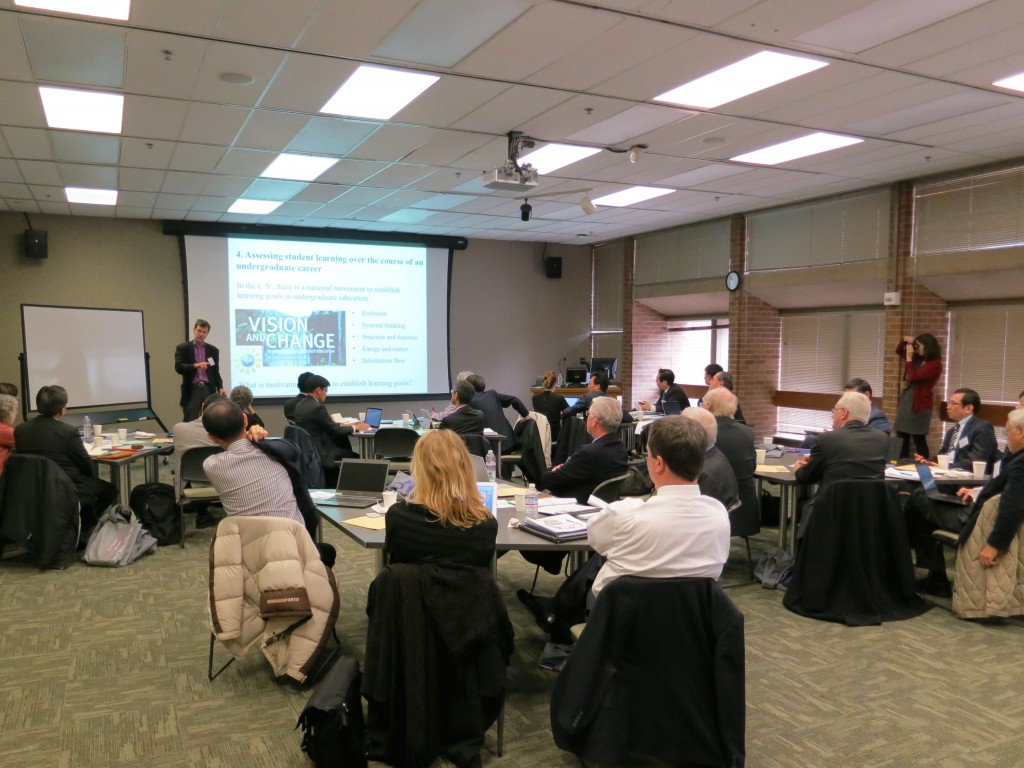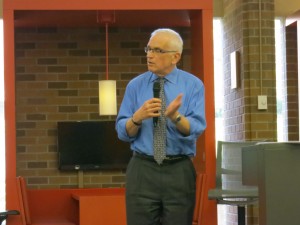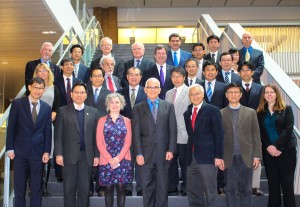APRU is an association of forty-five leading research universities in the Pacific Rim region. The association aims to facilitate collaboration between its member institutions, address issues relevant to the Pacific Rim region, and contribute to international society. Kyoto University has been actively engaged in APRU’s various activities since the association’s establishment in 1997.
Under the theme of “Innovation in Teaching and Learning”, the 3rd APRU Provosts Forum comprised seven sessions, which were attended by thirty provosts and representatives from twenty of APRU’s member universities. Prof. Toru Iiyoshi, deputy executive vice-president for education and director of the Center for the Promotion of Excellence in Higher Education (CPEHE), represented Kyoto University at the meeting.
In Session I: Research on Teaching and Learning, the participants discussed the various efforts and forms of support that are necessary to encourage studies on educational practices by faculty members, and to foster a culture of evidence-based teaching. The discussion topics also included an exploration of the values and methodologies important for education and research in various disciplines, how educational effects can be measured and evaluated, and how existing education and research achievements can be utilized to improve classes, subjects, and curricula.
In Session II: High-Impact Innovations in Practice, the participants discussed methods to incorporate high-impact and innovative educational practices into their teaching. From the viewpoints of faculty development and the use of teaching assistants, they considered the methods that could be used to improve education with minimal effort.
In Session III: Active Learning in Different Classroom Environments, the participants discussed how active learning should be adopted and implemented in different classroom environments (number or type of students, size of classroom, etc.) and different teaching and learning contexts (different subjects, disciplines, style of class, etc.). They shared information on active learning in large-sized classrooms, examples of ICT use, and active learning techniques which can be easily applied to many classes.
In Session IV: What Can Provosts Do to Encourage Better Teaching and Learning?, which was facilitated by Prof. Jerry Baldasty, interim provost of the University of Washington, the participants discussed the roles of provosts in promoting innovative education at their universities. They exchanged opinions from the five viewpoints of funding, leadership, networking, communication, and reward systems.
In the Session V: How Can APRU Institutions Collaborate to Advance Teaching and Learning Across Campuses?, some examples of cross-campus partnerships between APRU member universities to provide better education and faculty development were introduced. Then, small-group and whole-group discussions using audience response clickers were held to discuss how it might be possible to build such partnerships and practical communities among APRU institutions.
In Session VI: Innovation and the University, which was facilitated by Dr. Vikam Jandhyala, vice provost for innovation of the University of Washington, the participants discussed the importance of creating and disseminating innovations quickly and effectively. After the initiatives of the University of Washington were introduced, small-group discussions and presentations on the topic of “creating future universities” were held.
In the Session VII: Public-Private Partnership, the participants discussed the possibility of new public-private partnerships to promote university education and research activities, giving consideration to the current difficult situations caused by reductions in public funding for higher education in various countries. During the session, some examples of public-private partnerships were introduced, and small-group discussions for project planning to build public-private partnership models were held. At the end of the session, each discussion group presented their plans.
All of the forums sessions were held in active-learning style classrooms and utilized audience response clickers and a screen-sharing system. Rather than lecture-style presentations, group work, discussions, and presentations were held, enabling the participants to share their knowledge and experience of education practices, and introduce examples of existing initiatives and partnerships. Prior to the forum, the outline of each session, reference materials, and video materials were provided to the participants through an online learning management system (LMS). Many of participants gave very positive feedback on the effectiveness of those methods, and on the three-day forum as a whole. The success of the forum is anticipated to contribute to the promotion of networking and collaboration among the APRU member universities in the future, and enhance information exchange and personnel interaction for education enhancement and innovation.

The 3rd APRU Provosts Forum

Prof. Baldasty, interim provost of the University of Washington

The participants of the 3rd APRU Provosts Forum


